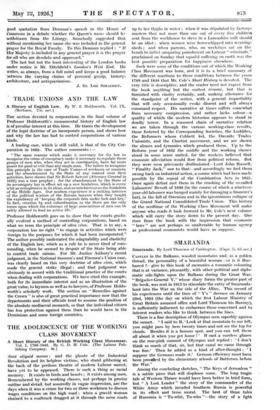TRADE . UNIONS AND THE LAW A. History of English Law.
By W. S. Holdsworth. Vol. IX. (Methuen. -25s. net.) THE section devoted to corporations in the final volume of Professor Holdsworth's monumental history of English law is of peculiar interest at this time. He traces the development of the legal doctrine of an incorporate person, and shows how
and why the law has had to control corporations of various kinds.
A leading case, which is still valid, is that of the City Cor- poration in 1682. The author comments :-
" The same reasons which make it necessary for the law to recognize the crime of conspiracy make it necessary to regulate these groups of men who, when they act in combination, have far more power for good or evil than any single man. The failure to recognize this principle in the case of Trade Unions of workmen or masters, and the abandonment by the State of any control over their activities, have shown that Sir Robert Sawyer (Attorney-General in 1682) was a true prophet ; for the abandonment by the State of its sovereignty has in effect set up a now feudalism, which is every whit as retrogressive in its ideas, and as mischievous as the feudalism of the Middle Ages. Our modern experience is a striking instance of the political wisdom of the Roman lawyers when they taught the expediency of keeping the corporals firm under lock and key.' In fact, creation by and subordination to the State are the only terms upon which the existence of large associations of men can be safely allowed to lead an active life."
Professor Holdsworth goes on to show that the courts gradu- ally evolved a method of controlling corporations, based on what we term the principle of ultra sires. That is to say, a corporation has no right " to engage in activities which were foreign to the purposes for which it had been incorporated."
The author possibly underrated the adaptability and elasticity Of the English law, which as a rule he is never tired of com- mending, when he seemed to despair of the State being able to control trade unions. For Mr. Justice Astbury's recent judgment, in the National Seamen's and Firemen's Union case, was clearly based on this very doctrine of ultra sires, which made the general strike illegal ; and that judgment was obviously in accord with the traditional practice of the courts when dealing with corporations. We have cited this example, both for its immediate interest and as an illustration of the great value, to laymen as well as to lawyers, of Professor Holds- worth's scholarly work. The section on " Remedies against the Crown " is also of great practical importance now that the departments and their officials tend to assume the position of the absolute mediaeval monarch, so that the individual citizen has less protection against them than he would have in the Dominions and some foreign countries.














































 Previous page
Previous page